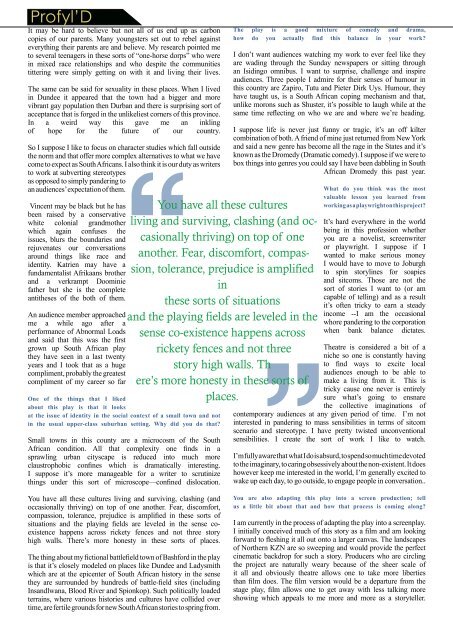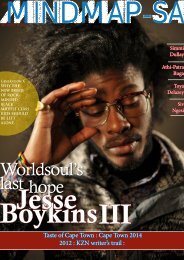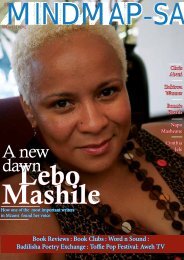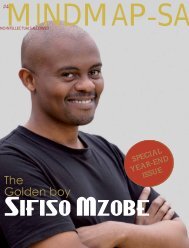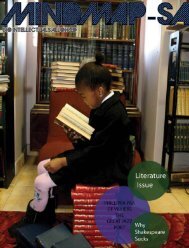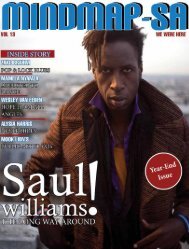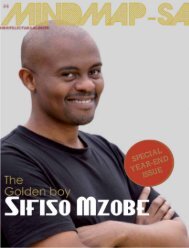MindMap-SA Issue 7
MindMap-SA Issue 7
MindMap-SA Issue 7
- No tags were found...
Create successful ePaper yourself
Turn your PDF publications into a flip-book with our unique Google optimized e-Paper software.
Profyl’DIt may be hard to believe but not all of us end up as carboncopies of our parents. Many youngsters set out to rebel againsteverything their parents are and believe. My research pointed meto several teenagers in these sorts of “one-horse dorps” who werein mixed race relationships and who despite the communitiestittering were simply getting on with it and living their lives.The same can be said for sexuality in these places. When I livedin Dundee it appeared that the town had a bigger and morevibrant gay population then Durban and there is surprising sort ofacceptance that is forged in the unlikeliest corners of this province.In a weird way this gave me an inklingof hope for the future of our country.So I suppose I like to focus on character studies which fall outsidethe norm and that offer more complex alternatives to what we havecome to expect as South Africans. I also think it is our duty as writersto work at subverting stereotypesas opposed to simply pandering toan audiences’ expectation of them.Vincent may be black but he hasbeen raised by a conservativewhite colonial grandmotherwhich again confuses theissues, blurs the boundaries andrejuvenates our conversationsaround things like race andidentity. Katrien may have afundamentalist Afrikaans brotherand a verkrampt Doominiefather but she is the completeantitheses of the both of them.An audience member approachedme a while ago after aperformance of Abnormal Loadsand said that this was the firstgrown up South African playthey have seen in a last twentyyears and I took that as a hugecompliment, probably the greatestcompliment of my career so farOne of the things that I likedabout this play is that it looksat the issue of identity in the social context of a small town and notin the usual upper-class suburban setting. Why did you do that?Small towns in this county are a microcosm of the SouthAfrican condition. All that complexity one finds in asprawling urban cityscape is reduced into much moreclaustrophobic confines which is dramatically interesting.I suppose it’s more manageable for a writer to scrutinizethings under this sort of microscope—confined dislocation.You have all these culturesliving and surviving, clashing (and occasionallythriving) on top of oneanother. Fear, discomfort, compassion,tolerance, prejudice is amplifiedinthese sorts of situationsand the playing fields are leveled in thesense co-existence happens acrossrickety fences and not threestory high walls. There’s more honesty in these sorts ofplaces.The play is a good mixture of comedy and drama,how do you actually find this balance in your work?I don’t want audiences watching my work to ever feel like theyare wading through the Sunday newspapers or sitting throughan Isidingo omnibus. I want to surprise, challenge and inspireaudiences. Three people I admire for their senses of humour inthis country are Zapiro, Tutu and Pieter Dirk Uys. Humour, theyhave taught us, is a South African coping mechanism and that,unlike morons such as Shuster, it’s possible to laugh while at thesame time reflecting on who we are and where we’re heading.I suppose life is never just funny or tragic, it’s an off kiltercombination of both. A friend of mine just returned from New Yorkand said a new genre has become all the rage in the States and it’sknown as the Dromedy (Dramatic comedy). I suppose if we were tobox things into genres you could say I have been dabbling in SouthAfrican Dromedy this past year.What do you think was the mostvaluable lesson you learned fromworking as a playwright on this project?It’s hard everywhere in the worldbeing in this profession whetheryou are a novelist, screenwriteror playwright. I suppose if Iwanted to make serious moneyI would have to move to Joburghto spin storylines for soapiesand sitcoms. Those are not thesort of stories I want to (or amcapable of telling) and as a resultit’s often tricky to earn a steadyincome --I am the occasionalwhore pandering to the corporationwhen bank balance dictates.Theatre is considered a bit of aniche so one is constantly havingto find ways to excite localaudiences enough to be able tomake a living from it. This istricky cause one never is entirelysure what’s going to ensnarethe collective imaginations ofcontemporary audiences at any given period of time. I’m notinterested in pandering to mass sensibilities in terms of sitcomscenario and stereotype. I have pretty twisted unconventionalsensibilities. I create the sort of work I like to watch.I’m fully aware that what I do is absurd, to spend so much time devotedto the imaginary, to caring obsessively about the non-existent. It doeshowever keep me interested in the world, I’m generally excited towake up each day, to go outside, to engage people in conversation..You have all these cultures living and surviving, clashing (andoccasionally thriving) on top of one another. Fear, discomfort,compassion, tolerance, prejudice is amplified in these sorts ofsituations and the playing fields are leveled in the sense coexistencehappens across rickety fences and not three storyhigh walls. There’s more honesty in these sorts of places.The thing about my fictional battlefield town of Bashford in the playis that it’s closely modeled on places like Dundee and Ladysmithwhich are at the epicenter of South African history in the sensethey are surrounded by hundreds of battle-field sites (includingInsandlwana, Blood River and Spionkop). Such politically loadedterrains, where various histories and cultures have collided overtime, are fertile grounds for new South African stories to spring from.You are also adapting this play into a screen production; tellus a little bit about that and how that process is coming along?I am currently in the process of adapting the play into a screenplay.I initially conceived much of this story as a film and am lookingforward to fleshing it all out onto a larger canvas. The landscapesof Northern KZN are so sweeping and would provide the perfectcinematic backdrop for such a story. Producers who are circlingthe project are naturally weary because of the sheer scale ofit all and obviously theatre allows one to take more libertiesthan film does. The film version would be a departure from thestage play, film allows one to get away with less talking moreshowing which appeals to me more and more as a storyteller.


